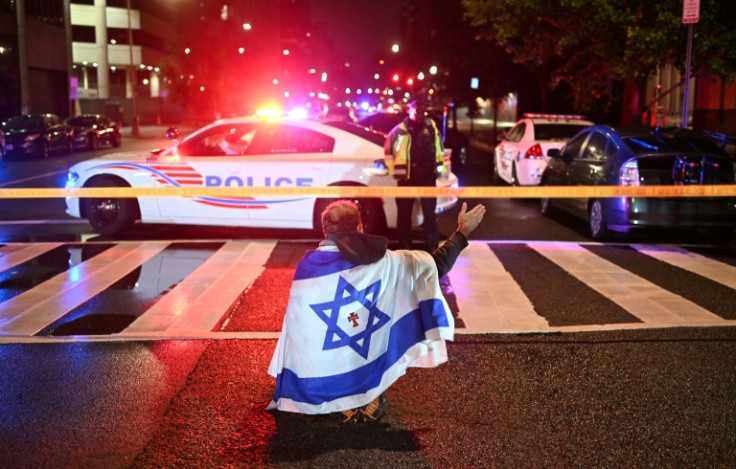Quick Facts About Elias Rodriguez, 'Free Palestine' Shooter: Who Is He and How He Chose His Target
Deadly shooting outside Capital Jewish Museum leaves two Israeli diplomats dead in what authorities call a hate-fuelled, politically motivated attack.

Two people are dead, a suspect is in custody, and Washington, D.C.'s diplomatic and Jewish communities are in mourning after a horrifying shooting outside the Capital Jewish Museum on 21 May. What began as a quiet evening turned to chaos when gunfire erupted just steps from the venue. The victims, Yaron Lischinsky and Sarah Milgrim, both employees of the Israeli Embassy, were attending a private event when they were gunned down.
The alleged shooter, Elias Rodriguez, a 30-year-old man from Chicago, was arrested at the scene after being tackled by bystanders. Witnesses reported hearing him shout 'Free Palestine' as he was restrained — a statement that has added political weight to an already devastating crime. Authorities are treating the attack as a politically motivated hate crime and a potential act of domestic terrorism.
Who Is Elias Rodriguez?
Before the shooting, Rodriguez was a largely unknown figure. He had no prior criminal record, no public history of violence, and wasn't on any law enforcement watchlist. Witnesses described him as unassuming, even friendly. Some attendees had spoken to him outside the museum and thought nothing of his presence.
That changed instantly. As the sound of gunfire tore through the air, panic spread. Rodriguez was quickly subdued, reportedly cooperative with police and even directing them to the location of his discarded weapon. The attack, brutal and brief, was over in minutes.
Investigators are now combing through his digital footprint: social media, search history, and potential connections to extremist groups. Early evidence points to strong political beliefs, particularly around the Israeli-Palestinian conflict. Whether those views were radicalised online or shaped by broader ideological influences is now a central focus of the investigation.
A Calculated Act of Violence
Police say the attack appeared premeditated. Rodriguez had allegedly visited the museum days earlier, likely scouting the venue. He seemed to know when and where the Israeli diplomats would arrive, choosing his moment carefully.
According to multiple witnesses, he fired at close range, causing immediate confusion and fear. After the shooting, he fled briefly, then discarded his weapon and surrendered without resistance.
'This wasn't random,' one law enforcement official told reporters. 'He knew what he was doing and who he was after.'
Remembering Yaron Lischinsky and Sarah Milgrim
The victims were more than just names on a tragic headline. Yaron Lischinsky had dedicated over a decade to diplomatic service and was widely respected for his work fostering cooperation and cross-cultural dialogue. His recent post in Washington reflected his long-standing commitment to diplomacy.
Sarah Milgrim, a rising star in policy advisory at the Israeli Embassy, was equally beloved. Known for her warmth, intellect, and deep commitment to her work, she had focused on building bridges between Jewish and Arab-American communities. Colleagues described her as passionate, sharp, and an advocate for inclusion.
Their deaths have left a profound void—not only among family, friends, and colleagues, but in the mission they shared: promoting peace, mutual understanding, and global cooperation.
Condemnation and Grief from Across the Globe
Within hours, officials from both the United States and Israel issued a joint statement denouncing the attack as 'an abhorrent act of hatred.' Security protocols for diplomatic events are already being reviewed in response.
The FBI, the Department of Homeland Security, and Washington Metropolitan Police have launched a joint investigation. Authorities are also exploring whether Rodriguez had any accomplices or ideological support.
Legal Fallout and Unanswered Questions
Rodriguez remains in custody and has reportedly confessed, though no formal plea has been entered. A preliminary hearing is expected within days, and prosecutors may pursue charges under federal hate crime statutes and terrorism laws.
Yet beyond the courtroom, deeper questions loom. What compels someone to turn political anger into violence? How do geopolitical tensions manifest in local communities? And how can those who dedicate their lives to diplomacy and peace be better protected?
This wasn't just a targeted attack on two embassy employees. It was an attack on everything they represented. And as Washington and the international community reckon with this tragedy, one thing is clear: the fight against hate-fuelled violence is far from over.
© Copyright IBTimes 2025. All rights reserved.





















